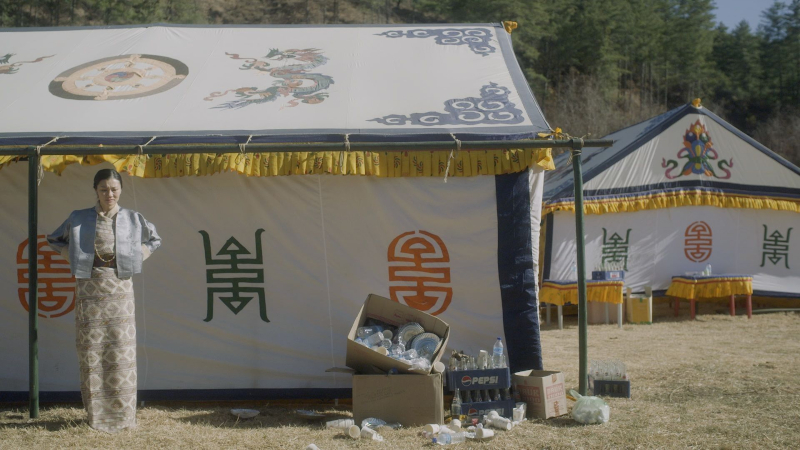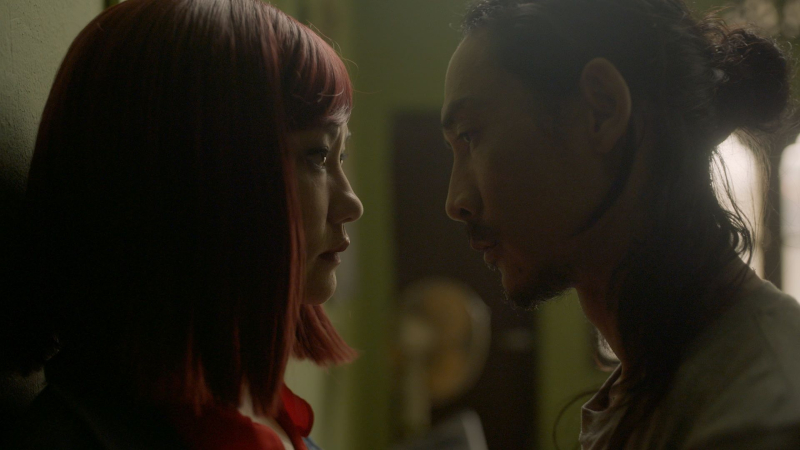Director – Dechen Roder – 2024 – Bhutan, Norway, Italy, France – 112m
*****
A woman fired from her teacher’s job for appearing in an online sex video she claims is of someone else sets out to find her doppelgänger and clear her name – winner of Best Director in the Critics’ Picks Competition of the 28th Tallinn Black Nights Film Festival; plays Tyneside Cinema, Newcastle at 7.30 pm, Tuesday, July 15th 2025 as part of GemArts Masala Festival
This starts off deceptively with singing children’s voices, cutting into accompanying images of a school play with the children costumed as various types of flowers. The camera moves slowly to the back of the school hall where watching teacher Nima (Tandin Bidha) is told she is urgently needed in the office of the principal (Kezang Dorjee aka Kazee), where she finds herself being fired because of the video, now widely seen online, in which she appears. She protests that the person in the video isn’t her, but the principal says he can’t have her seen on school premises with so many parents about today.
She phones her boyfriend Penjor (Dorji Wangdi), who is in the middle of a gig hosting traditional Bhutanese folk plays. She goes to see him. His reaction is, “so, I’m not the only person who thinks it’s you.” She protests that it’s not and asks him to show her the video so she can prove it. She must be the only person in Bhutan who hasn’t seen it.
Nima takes herself to the dodgy video dealer (Karma Tenzin) from where she knows Penjor got his copy of the video. The man doesn’t have it on DVD, and suggests she get a friend to send it to her on WeChat. She pleads, and he sorts out a facility for her to watch it online there and then. She gets him to copy it to her phone. Later, she watches it as she tries to prepare some food in her kitchen, but she finds the whole experience deeply upsetting. She phones Penjor to tell him that the person in the video has a mole on her cheek, which Nima does not. “You could have drawn it on yourself,” he says.
She notices and enlarges a tiny detail: the sign of a bar, enlarging it: a screenshot within a screenshot. The Jewel Hotel and Bar, Gelephu. She drives, to the accompaniment in her car of a traditional Bhutanese folk song (“I packed 16 arrows and my best bow…”), with sunny weather outside. Although the weather is sunny not raining, and this is folk music not Bernard Herman, this recalls Marion (Janet Leigh) driving in Psycho, (Alfred Hitchcock, 1960). Nima, like Marion, has stepped into a private trap back where she came from, one from which she hopes (and may or may not be able) to extricate herself. Unlike Marion, if Nima is telling the truth about not being the girl in the video, this is not a trap of her own making. Perhaps the sunlight is an indication that things will turn out well.

At her destination, in Gelephu, she checks into a hotel. She goes out exploring the narrow streets. Outside one storefront window can clearly be heard two men in conversation:
“No. It doesn’t look like her”
“You are right. She doesn’t look like…”
“She would do that kind of thing.”
“Yes, you are right.”
She enters the bar, and they greet her by name: Meto.
She doesn’t know the name, but then one of them helpfully directs her to Moon Bar, where she’ll find Tandin, Meto’s ex-boyfriend. No-one has seen Meto around for a while.
At Moon Bar, a musician with an acoustic guitar is singing on stage, a song about someone who left him. This turns out to be Tandin (Jimmie Wangyal). But, as he explains, he has no idea where Meto is. Later, Nima follows him from the place, a drunk woman on his arm, to his upstairs flat, sitting outside on the stairwell. When she’s waiting there again two days later, a girl comes out and says to her, “hey, you’re Meto.” Nima knocks on Tandin’s door. It’s like a male / female role reversal of cop Scottie (James Stewart) knocking on Judy (Kim Novak)’s door in Vertigo (Alfred Hitchcock, 1958) as he searches for the vanished Madeleine (also Novak). He invites her in for tea, and tells the story of how he met Meto when she auditioned as singer and dancer, and he tried to throw her off with his crazy playing, but she kept up, a scene shown in flashback as he talks, with Meto (Tandin Bidha, now with a short bob and a red dress). “If you find her,” he says, “don’t tell me anything.”
Nima finally makes it to the Jewel Hotel and Bar, which she briefly approaches a half finished building like Marion approaching the house behind the Bates Motel. And then she hears something and turns round. Inside, as she enters, a woman says, “it’s like seeing a ghost.” “Did you know Meto?,” Nima asks her naively. At Meto’s old workplace, Phuntsu the boss (Tshering Dorji) tells her: “you look exactly like Meto.” He gives her the address of Meto’s village, as she might have gone back there. She drives there, walks to Meto’s house and has to explain to her relatives that she is not Meto. However, Meto’s grandmother Aum Tshomo (Choney Zangmo), whose sight is severely impaired, welcomes Nima as Meto, and over a cup of tea asks ‘Meto’ if she has bought her song back from the city, where the city people stole it, so she can die in peace. The grandson (Bumpa Wangdi) tells her Meto is somewhere in Butan, because she is sending them money…
All this is punctuated with further flashbacks of Meto, often wearing a red dress and / or bathed in orange or yellow sunlight, she draws on Tandin’s back joining his moles. Bathed in yellow light in a bar flooded with traditional Bhutanese musicians, she records a man singing a traditional song before joining Tandin for a bite to eat, she wears a red dress walking past a yellow wall, she sits in a yellow top and red shoes singing Bhutanese folk songs outside Tandin’s door.
By way of contrast, the seemingly more conservative Nima is always shown with long hair and in envronments in pastel colours. This in turn is a riff on Vertigo’s alternate red and green scenes for stop and go, with fiery orange, red and yellow for liberated, sexually active girl and softer pastel shades for conservative, ‘good girl’. The names further underscore the dual character identities: Nima sounds a lot like the Western name Nemo (Latin for ‘nobody’), a female no-one. Meto sounds a lot like the Western word ‘meta’, the self-referential term referring to something of its own type.

Yet, the Nima / Meto character, and therefore the film itself, is ambiguous. Towards the end, Meto, hitherto only seen in flashback edited in parallel to Nima’s narrative search for her, comes back to the village in the present to confront the person who surreptitiously took the video and ruined her life. And then take that person to court. Yet this Meto is shown against the pastel colours previously associated with Nima. Are they one and the same person? Are they two separate people? The film skilfully walks this tightrope and never falls off, finally arriving at a satisfying conclusion.
Tandin Bidha is extraordinary in the doppelgänger lead roles, making each woman recognisably different, backed up by distinctive hairstyle, costume design and, especially, the use of alternate colour palettes. The whole possesses the intensity of Vertigo, with which it shares many themes and ideas, although here they are presented and explored in the context of a completely different culture. Absolutely magnificent.
I, the Song plays Tyneside Cinema, Newcastle at 7.30 pm, Tuesday, July 15th 2025 as part of GemArts Masala Festival. Book here.
I, the Song won Best Director in the Critics’ Picks Competition of the 28th Tallinn Black Nights Film Festival which runs in cinemas from Friday, November 8th to Sunday, November 24th 2024.
This review originally appeared on DMovies.org: you can find it here.
Trailer:
